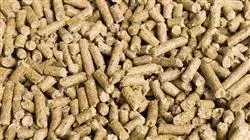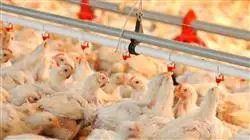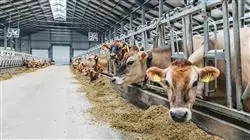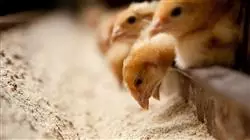University certificate
The world's largest faculty of nutrition”
Description
A Professional master’s degree that will enable you to work in all fields of Animal Nutrition with the competence of a high-level professional”

The Master's Degree in Animal Nutrition enables the incorporation, integration and specialization of nutritionists in one of the most important sectors of animal production in the current day. It is a sector with the greatest demand for professionals with specialist knowledge.
The current world population is estimated to be 7.6 billion people and is expected to increase to 8.6 billion by 2030. Animal nutrition is one of the disciplines being called upon to find ways in which to produce sufficient and economical protein, in an efficient and sustainable manner, to be able to feed this growing demand in the population.
The Professional master’s degree format allows participants to learn autonomously and optimize their time management.
Study in depth the main raw materials used in the formulation of balanced feed, the characteristics, inclusion levels and quality parameters, since without quality in the basic components of the feed, there is no nutrition.
An entire module is dedicated to the additives used in Ration Manufacturing. This segment is evolving year after year and includes important topics such as antibiotic-free production and the use of phytogenetic crops, which are currently the most topical issues.
In summary, this Master's Degree is an ambitious, broad, structured and interconnected proposal, which covers everything from the fundamental and relevant principles of nutrition to food manufacturing.
Become a professional in one of the most in-demand fields of the moment: train as a Professional master’s degree in Animal Nutrition for Nutritionists with this comprehensive online master’s degree“
This Professional master’s degree in Animal Nutrition for Nutritionists trains the student to specialize in the food manufacturing process. It also offers you the characteristics of a high-level scientific, teaching, and technological course. These are some of its most notable features:
- Latest technology in online teaching software
- Highly visual teaching system, supported by graphic and schematic contents that are easy to assimilate and understand
- Practical cases presented by practising experts
- State-of-the-art interactive video systems
- Teaching supported by telepractice
- Continuous updating and recycling systems
- Self-regulating learning: full compatibility with other occupations
- Practical exercises for self-evaluation and learning verification
- Support groups and educational synergies: questions to the expert, debate and knowledge forums
- Communication with the teacher and individual reflection work
- Content that is accessible from any fixed or portable device with an Internet connection
- Supplementary documentation databases are permanently available, even after the course
With a methodological design based on proven teaching techniques, this Professional master’s degree in Animal Nutrition for Nutritionists will take you through different teaching approaches to allow you to learn in a dynamic and effective way”
Our teaching staff is made up of professionals from different fields related to this specialty. In this way, we ensure that we provide you with the training update we are aiming for. A multidisciplinary team of doctors with training and experience in different environments, who will develop the theoretical knowledge in an efficient way, but above all, they will bring their practical knowledge from their own experience to the course: one of the differential qualities of this training.
The efficiency of the methodological design of this master's degree, enhances the student's understanding of the subject. Developed by a multidisciplinary team of e-learning experts, it integrates the latest advances in educational technology. In this way, you will be able to study with a range of easy-to-use and versatile multimedia tools that will give you the necessary skills you need for your specialization.
The design of this program is based on Problem-Based Learning: an approach that conceives learning as a highly practical process. To achieve this remotely, we will use telepractice learning: with the help of an innovative interactive video system, and learning from an expert, you will be able to acquire the knowledge as if you were actually dealing with the scenario you are learning about. A concept that will allow you to integrate and fix learning in a more realistic and permanent way.
Join the elite, with this highly effective training specialization and open new paths to help you advance in your professional career"

Our innovative telepractice concept will give you the opportunity to learn through an immersive experience, which will provide you with a faster integration and a much more realistic view of the contents: “learning from an expert”
Objectives
Our objective is to train highly qualified professionals for work experience. An objective that is complemented, moreover, in a global manner, by promoting human development that lays the foundations for a better society. This objective is focused on helping medical professionals reach a much higher level of expertise and control. A goal that you will be able to achieve in just six months, thanks to a highly intensive and detailed course.

If your objective is to broaden your skill set to include new paths for success and development, this is your master's degree: a specialization that aspires to excellence”
General Objectives
- Determine the properties, use and metabolic transformations of nutrients in relation to the nutritional needs of an animal
- Provide clear and practical tools so that the professional can identify and classify the different foods that are available in the region and have better elements of judgement to make the most appropriate decision in terms of differential costs, etc.diferenciales, etc.
- Propose a series of technical arguments which allow for a better quality of diet and nutrition and therefore, improve the end produce (meat or milk)
- Analyze the different raw material components with both positive and negative effects on Animal Nutrition for Nutritionists and how animals use them for the production of animal protein
- Identify and understand the different levels of digestibility for each of the various nutritional components according to their origin
- Analyze the key aspects for the design and creation of diets (food) aimed at achieving the maximum utilization of nutrients by animals intended for animal protein production
- Provide specialized training on the nutritional requirements for the two main species of birds to be used in animal protein production
- Develop specialist understanding of the nutritional requirements of the porcine species and the different feeding strategies needed in order to guarantee that they reach the expected welfare and production standards according to their production stage
- Provide practical, theoretical and specialized knowledge on the physiology of canine and feline digestive systems
- Analyze the digestive system of ruminants and their particular way of assimilating nutrients from fiber-rich foods
- Analyze the main additive groups used in the food production industry, focused on ensuring the quality and performance of different food products
- Analyze, in a clear way, how the complete animal feed manufacturing process is developed: the phases and processes which feed undergoes to guarantee its nutritional composition, quality and safety
Specific Objectives
Module 1
- Develop the most relevant concepts of Animal Nutrition and Feeding
- Determine how digestive systems are formed and the differences between animal species (monogastrics and ruminants)
- Analyze the functionality, metabolism and differences between the digestive systems of different species
- Establish the different nutritional components of the raw materials used in food production and their function within Animal Nutrition for Nutritionists
- Determine how the nutrients are used by different animal species
- Compare and contrast the digestive systems of the main species of zootechnical interest
- Identify the different nutritional components of the raw materials used in food production and their function within Animal Nutrition for Nutritionists
- Examine the analyses used to the determine the composition of different foods
- Develop the variables and units used to estimate the nutritional intake and requirements
- Determine how to measure the energy content of foods and their expressions
Module 2
- Develop the most important concepts of Animal Nutrition for Nutritionists, taking into account the functions and effects of food in the digestion process in large and small livestock
- Classify foods according to their origin and their nutritional characteristics
- Design a balanced diet considering the nutritional requirements of the species and categories
- Implement the procedures for manufacturing concentrates, guaranteeing the quality of the product to be used for feeding the different productive species
- Apply nutrition and feeding strategies for the different productive species according to an annual program based on the herd's requirements
- Evaluate the nutritional quality and impact on production systems (meat or milk) of different fresh, preserved and natural feed. These could be either in direct grazing or as forage reserves such as hay (rolls) or whole plant silage, with or without the addition of additives (Nutriliq, Smartfeed, etc.), Multi-Nutritional Blocks (MNB), Rumen Activator Supplements (RAS) or energy or protein concentrates
- Develop the main chemical determinations that characterize a feed (concentrates, fresh forages, preserved forages and additives)
Module 3
- Develop the different nutrients contained in the raw materials used in Animal Nutrition for Nutritionists
- Develop the different components of each one of the nutrient groups
- Determine the destinations or metabolic pathways of nutrients to be utilized by the animal
- Establish how animals obtain energy from different nutrients and what energy metabolism consists of
- Analyze the different assimilation processes of nutrients that different species of animals have and which are necessary for their well-being and production
- Evaluate the importance of water as a nutrient and the effect that it has on animals
Module 4
- Develop the concepts of digestibility and how it is determined
- Analyze the advances in protein nutrition and the importance of synthetic amino acids in Animal Nutrition for Nutritionists
- Identify the factors which are involved in the definition of the different nutrient levels
- Establish the critical points in the use of fats, their quality and effect on nutrition
- Develop the basic concepts of organic minerals and their importance
- Justify the concept of intestinal integrity and how to enhance it in production
- Analyze patterns in the use of antibiotics in Animal Nutrition for Nutritionists
- Define the patterns in precision nutrition and the most influential factors in its application
Module 5
- Establish the nutritional requirements and the feeding programs of broiler chickens
- Specify the nutritional requirements of laying hens (commercial eggs)
- Specify the nutritional requirements and feeding programs in confusion matrices
- Identify the critical phases of broilers and layers and the adjustments that can be implemented through the use of special diets
- Establish the different nutritional strategies used to manage challenges such as heat stress and shell quality
- Analyze the Nutritional Profiles and Strategies that allow higher yield of meat cuts and modification of egg size
- Determine the different production phases in commercial poultry farming by species
- Compile the different feeding programs in commercial poultry farming
- Apply different strategies in the application of feeding programs focused on guaranteeing zootechnical results
Module 6
- Establish the nutritional requirements of fattening pigs
- Determine the nutritional requirements of breeding sows
- Identify the different stages of production in commercial swine farming
- Develop different feeding programs in commercial swine farming
- Analyze different strategies in the application of feeding programs focused on guaranteeing zootechnical results
- Understand the anatomical and physiological differences in the digestive system of swine which allows them to use alternative raw materials in their diet
- Establish the nutritional requirements of slaughter pigs according to their age, production stage and genetic line
- Establish the nutritional requirements of sows and breeding boars in each of their life stages and production phases
- Design nutritional and feeding programs for swine according to their specific requirements based on age and physiological state
- Develop different feeding programs in commercial swine farming
- Apply different strategies in the application of feeding programs focused on guaranteeing zootechnical results
Module 7
- Identify those myths which are related to the diet of cats and dogs
- Establish nutritional requirements for cats and dogs
- Analyze the concept of a balanced diet, focusing on the factors that influence their ingestion
- Analyze the dietary treatments in certain pathologies whose use is aimed at reducing symptoms and improving the animal's condition
- Guarantee an appropriate diet according to the stage of development
- Evaluate the types of food available on the pet food market
- Establish an appropriate diet based on physiological state and the development of the species in question
Module 8
- Analyze the digestive system of ruminants and their particular way of assimilating nutrients from fiber-rich foods
- Analyze the nutritional metabolism of ruminants, recognising their potential and their limitations
- Determine the nutritional requirements for the maintenance and production of the main ruminants of zootechnical interest
- Examine the main food resources for ruminants’ nutrition, their main characteristics, their advantages and limitations
- Evaluate the main feeding strategies for ruminants according to the production context
Module 9
- Analyze the different types of additives which exist in the animal feed and nutrition market
- Define the recommendations for the use and functionality of the different additive groups
- Gain up-to -date knowledge of the new technology focused on improving the quality and efficiency of animal feed
- Identify mycotoxins as the hidden enemy in diet quality, animal health and productivity; what are the strategies for their control, the different types and use of mycotoxin binders
- Specialize in the use of enzymes in balanced feed, what they are, the differences between enzymes of the same category, what they are used for and the benefits of their incorporation in the diet
- Analyze phytogenics as a category that goes beyond essential oils; what they are, types of phytogenic substances, modes of use and benefits
Module 10
- Determine the processed involved in the creation of feed for animals
- Establish an appropriate way to manage raw materials
- Analyze the different food presentations and the food manufacturing processes themselves
- Identify the different equipment used in the manufacturing of food
- Implement monitoring and control programs at critical points in the food manufacturing process
- Implement sampling and establish its importance in the quality control process

A path to achieve specialization and professional growth that will propel you towards a more competitive position in the employment market”
Professional Master's Degree in Animal Nutrition for Nutritionists
Nature tends to be a complex network of mutualistic links: plant roots, for example, provide fungi with carbohydrates and fungi provide them with water and minerals. Humans provide food for certain animals and these in turn provide food for humans. The imbalance, however, in the symbiosis of the latter has been the focus of both pathologies for humans and collateral damage to the animal kingdom. It is for this reason that the study of nutrition cannot remain on the sidelines of this aspect. Seeing in this a need for improvement, TECH Global University presents its Professional Master's Degree in Animal Nutrition for Nutritionists: a program that trains the student in everything related to the feeding and digestive process of poultry, pigs, ruminants and fish as well as its relevance to the human organism in nutritional terms. With a solid syllabus divided into ten modules, we will provide you with the most relevant knowledge within a constantly growing labor sector that requires more and more personnel versed in its models and practices.
Dare to study Animal Nutrition
Can you identify the advantages and disadvantages of specific raw materials in a farm's feed for the subsequent production of animal proteins? Our program is designed precisely to add to your academic training the competencies that will give you the confidence to solve issues such as this. In this way, you will be educating yourself in three issues of enormous benefits: first, to contribute to an ideal diet for different animals that increases their quality of life and mitigates the unethical exploitation of them; second, to help improve human health by optimizing their digestive process and regulating the consumption of animal products; and third, to know the variants of a market with wide labor demand such as the poultry and dairy industries, among others, which will increase your chances of aspiring to a satisfactory position. Do you want to stand out for the versatility of your intellect and demonstrate skills that really generate a positive impact on the food chain and therefore on the interaction ecosystems? With TECH you have this opportunity for a promising future open to you.







